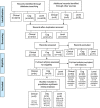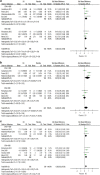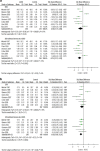Omega-3 Polyunsaturated Fatty Acids in Youths with Attention Deficit Hyperactivity Disorder: a Systematic Review and Meta-Analysis of Clinical Trials and Biological Studies
- PMID: 28741625
- PMCID: PMC5669464
- DOI: 10.1038/npp.2017.160
Omega-3 Polyunsaturated Fatty Acids in Youths with Attention Deficit Hyperactivity Disorder: a Systematic Review and Meta-Analysis of Clinical Trials and Biological Studies
Abstract
The role of omega-3 polyunsaturated fatty acids (omega-3 or n-3 PUFAs) in the pathogenesis and treatment of children and adolescents with attention deficit hyperactivity disorder (ADHD) is unclear. A systematic review followed by meta-analysis was conducted on: (1) randomized controlled trials (RCTs) assessing the effects of n-3 PUFAs on clinical symptoms and cognition in children and adolescent with ADHD; and (2) case-control studies assessing the levels of n-3 PUFAs in blood and buccal tissues of children and adolescents with ADHD. In seven RCTs, totalling n=534 randomized youth with ADHD, n-3 PUFAs supplementation improves ADHD clinical symptom scores (g=0.38, p<0.0001); and in three RCTs, totalling n=214 randomized youth with ADHD, n-3 PUFAs supplementation improves cognitive measures associated with attention (g=1.09, p=0.001). Moreover, children and adolescents with ADHD have lower levels of DHA (seven studies, n=412, g=-0.76, p=0.0002), EPA (seven studies, n=468, g=-0.38, p=0.0008), and total n-3 PUFAs (six studies, n=396, g=-0.58, p=0.0001). In summary, there is evidence that n-3 PUFAs supplementation monotherapy improves clinical symptoms and cognitive performances in children and adolescents with ADHD, and that these youth have a deficiency in n-3 PUFAs levels. Our findings provide further support to the rationale for using n-3 PUFAs as a treatment option for ADHD.
Figures






References
-
- Barkley RA (1997). Behavioral inhibition, sustained attention, and executive functions: constructing a unifying theory of ADHD. Psychol Bull 12: 65–94. - PubMed
-
- Burgess JR, Stevens L, Zhang W, Peck L (2000). Long-chain polyunsaturated fatty acids in children with attention-deficit hyperactivity disorder. Am J Clin Nutr 17(suppl): 327S–330S. - PubMed
-
- Chang JP, Chang SS, Yang HT, Palani M, Chen CP, Su KP (2015). Polyunsaturated fatty acids (PUFAs) levels in patients with cardiovascular diseases (CVDs) with and without depression. Brain Behav Immun 44: 28–31. - PubMed
-
- Chang JP, Jiling L, Huang YT, Lu YJ, Su KP (2016). Delay aversion, temporal processing, and N-3 fatty acids intake in childrne with attention- deficit/hyperactivity disorder (ADHD). Clin Psychol 4: 1094–1103.
Publication types
MeSH terms
Substances
Grants and funding
LinkOut - more resources
Full Text Sources
Other Literature Sources
Medical
Research Materials

